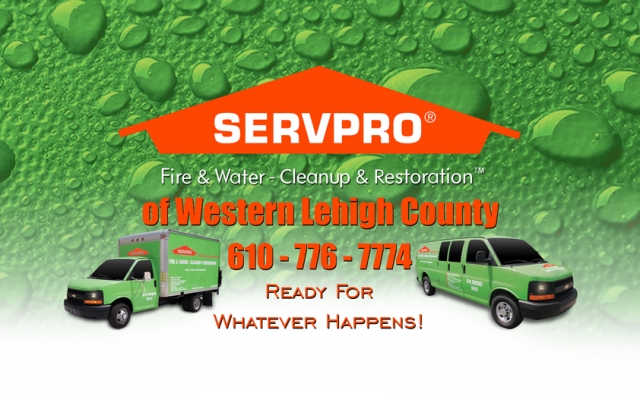
Servpro of Western Lehigh County
PHONE NUMBER : 610-776-7774
Follow Us
Categories
Business Services - Commercial & Industrial Cleaning
Business Services - Repair & Service
Community & Government - Emergency Services
Community & Government - Water & Sewage
Home & Garden - Carpet Rug & Upholstery Cleaners
Home & Garden - Drapery Carpet & Upholstery Cleaning
Home & Garden - House & Apartment Cleaning
Home & Garden - Steam Cleaning
Industry - Industrial Cleaning & Maintenance Contractors
Personal Care & Services - Cleaning & Maintenance Services
Frozen Water Pipes and What To Do...
THE PROBLEM: "Water has a unique property in that it expands as it freezes. This expansion puts tremendous pressure on whatever is containing it, including metal or plastic pipes. No matter the "strength" of a container, expanding water can cause pipes to break. Pipes that freeze most frequently are those that are exposed to severe cold, like outdoor hose bibs, swimming pool supply lines, water sprinkler lines, and water supply pipes in unheated interior areas like basements and crawl spaces, attics, garages, or kitchen cabinets. Pipes that run against exterior walls that have little or no insulation are also subject to freezing." according to RedCross.org.
WHAT TO DO? It's the thawing pipes that leak and spew water after a hard freeze. Running water through the pipe will help melt ice in the pipe. Apply heat to the section of pipe using an electric heating pad wrapped around the pipe, an electric hair dryer, a portable space heater (kept away from flammable materials), or by wrapping pipes with towels soaked in hot water. For more information on preventing and thawing frozen pipes, go here.
If you are not fortunate enough to stop your pipes from leaking into your house and causing water damage, be sure to call SERVPRO of Western Lehigh Valley to help you with clean up and restoration.
